One holiday season party not to miss: the 250th anniversary of the Boston Tea Party
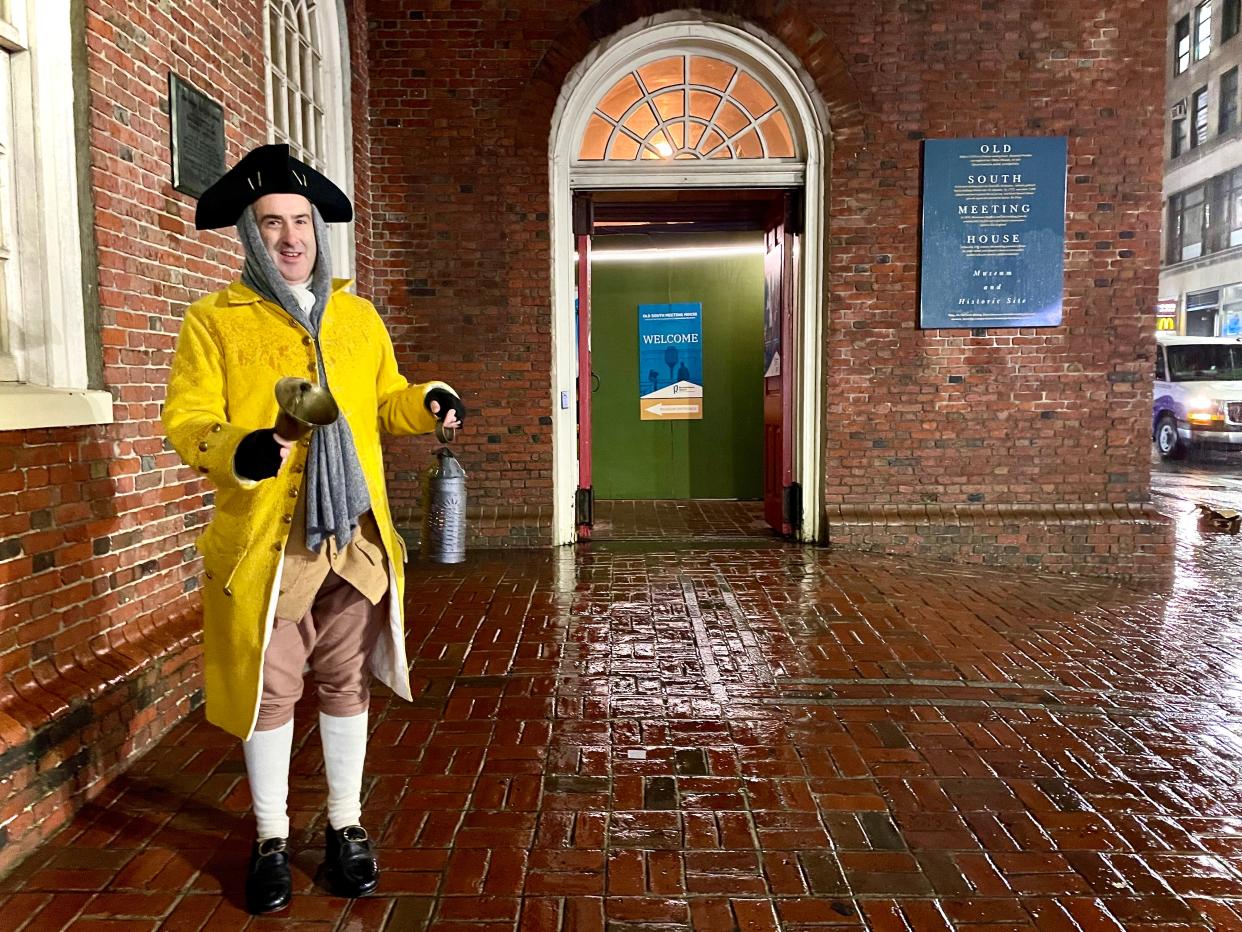
Sam Adams does not look happy. He starts yelling at a rather nicely attired gentlemen, who it appears the red-faced Adams really does not like.
A great debate ensues as various people stand and orate, and some plain just stand and yell.
The annual reenactment of the meeting on Dec. 16, 1773, at the Old South Meeting House in Boston’s Downtown Crossing is a heated affair, indeed. This was the meeting that preceded the humorously named but infamous act known as the Boston Tea Party, often cited as the event that kicked the Revolutionary War into action. Well, at least nudged it. It would be another 15 months before the first battle ensued in earnest.
Shutdown by the pandemic, 2022 saw the first such reenactment since 2019, and it returned somewhat changed. In this day and age, it is acknowledged before many such performances play out that we stand on another’s land, “Occupied lands belonging to the Massachusetts, the Nipmuc, and the Wampanoag,” it is solemnly noted at the Old South Meeting House before the “performance” begins.
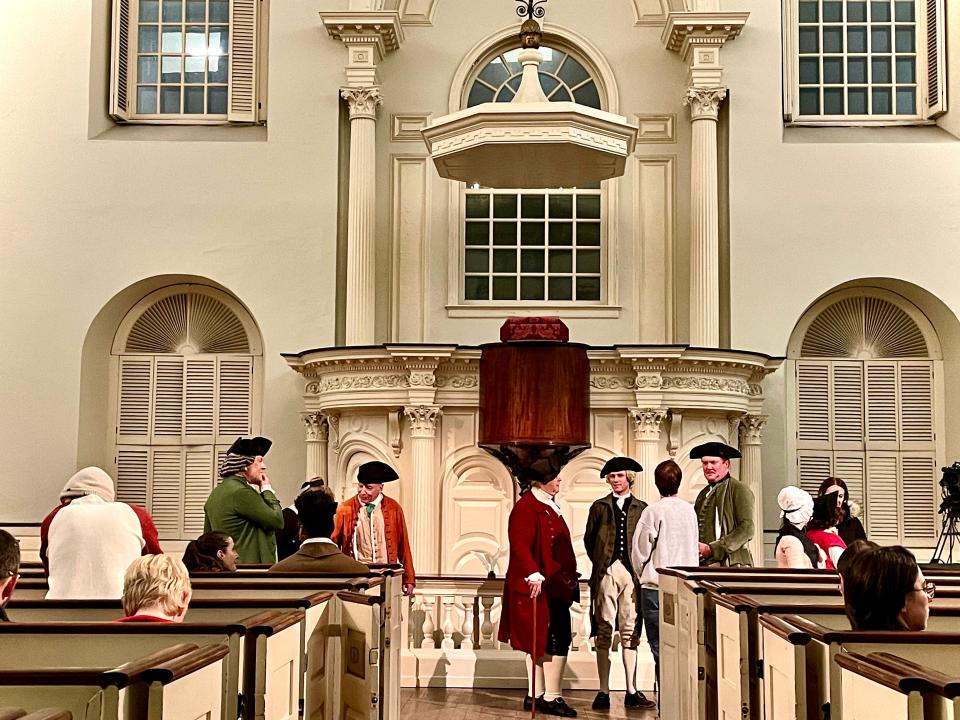
'Here ye sons of liberty, speak tonight'
It is the Crown’s latest tax, on tea no less, that currently stirs up the colonists' growing rancor — the ire against the Crown’s list of taxes is long by now, and many duties had been successfully repealed. But not the tea tax, which would bail out the once-mighty but now failing London-based East India Company.
For weeks the fate of three East India Company schooners — the Beaver, the Eleanor and the Dartmouth, all moored and guarded on Griffin Wharf — has been discussed, the Crown and the governor of Massachusetts demanding they be unloaded, the merchants of Boston refusing to allow such a thing.
You can imagine it was a cold, frosty night that Dec. 16 in 1773. Not many people would be out and about in Boston. Apart from those gathering for that meeting at the Old South Meeting House, whose wooden pews are packed with impassioned or worried faces. Much mumbling and grumbling ensues until the meeting is called to order by some bewigged fellow seated high up in a galleried perch, for all to see and heed.
“Here ye sons of liberty, speak tonight,” commands the moderator.
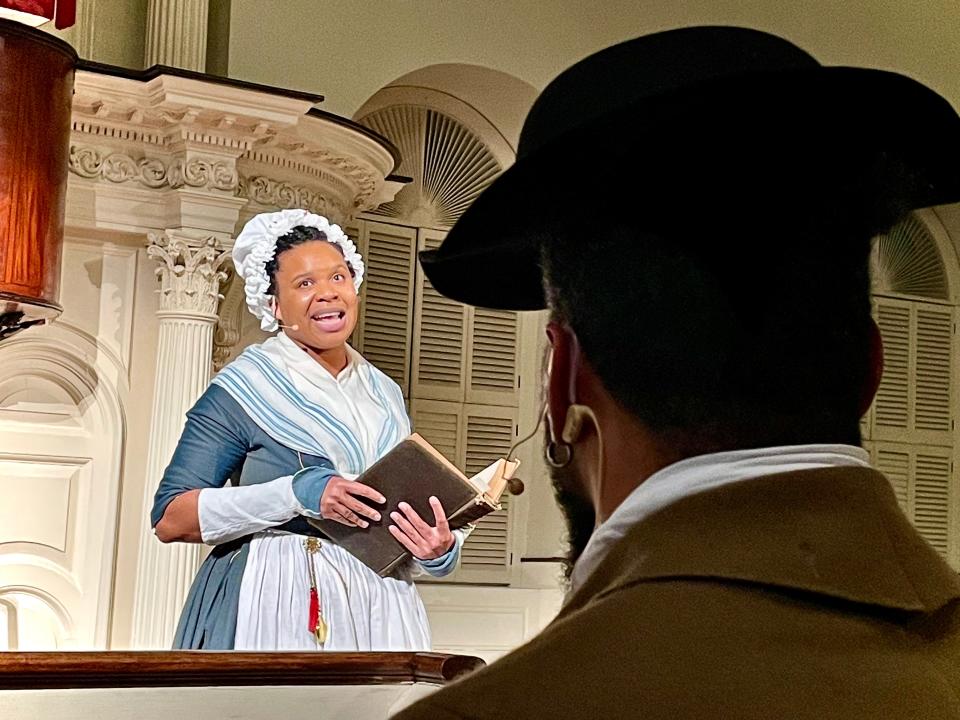
'Petty tyrants are in this town'
Besides Sam Adams, also present and equally incensed is Henry Knox, a member of the Boston Grenadier Corps militia; Judge Samuel P. Savage of Weston, a merchant who would go on to become a member of the Massachusetts Board of War; and James Otis Jr., a loyalist by birth but now a revered figure of dissent following his speeches on constitutional rights. (Otis, his quick mind eventually dissolved into mental illness, does not live to see much of the republic he is shaping.)
Ebenezer Macintosh, a shoemaker who fought in the British army at Fort Ticonderoga in 1758 is here, protesting taxes once again. Josiah Quincy is here and seems to have a cool head among many who do not. James Lovell, a Boston Latin schoolteacher, who had spoken publicly and at length against the Boston Massacre two years earlier, is here, as is his close friend Dr. Joseph Warren. In less than two years, within days of the Battle of Bunker Hill in June 1775, Lovell is arrested and imprisoned by the Crown; Warren is dead on the battlefield.
Phillis Wheatley is here and speaks. Although well known at the time for her poetry both in the colonies and in England, it is doubtful a woman, let alone a Black person, emancipated just a few months earlier, had a voice.
Susannah Copley, whose father, Richard Clarke, worked for the despised East India Company, speaks. Even Susannah, a white woman from a wealthy family and the wife of noted painter John Singleton Copley, would not have had a voice in 1773. The addition of women and also an enslaved man, and even having audience members speak in opposite gender roles — one man is Abigail Adams, a girl is James Otis. Jr. — plays with historical fact for inclusivity.
One thing that has changed little: the political divide: When a Tory suggests the Patriots are criminals, he is soon shot down, but only by big boos.
“Remove the Dartmouth,” someone is suggesting. Though who knows to where, and what of the other two ships?
“Petty tyrants are in this town,” yells someone who probably means the Crown’s men — very probably.
“Taxes should to go to the colonies, not the Crown,” bellows someone.
“Treason!” yells a loyalist in disgust.
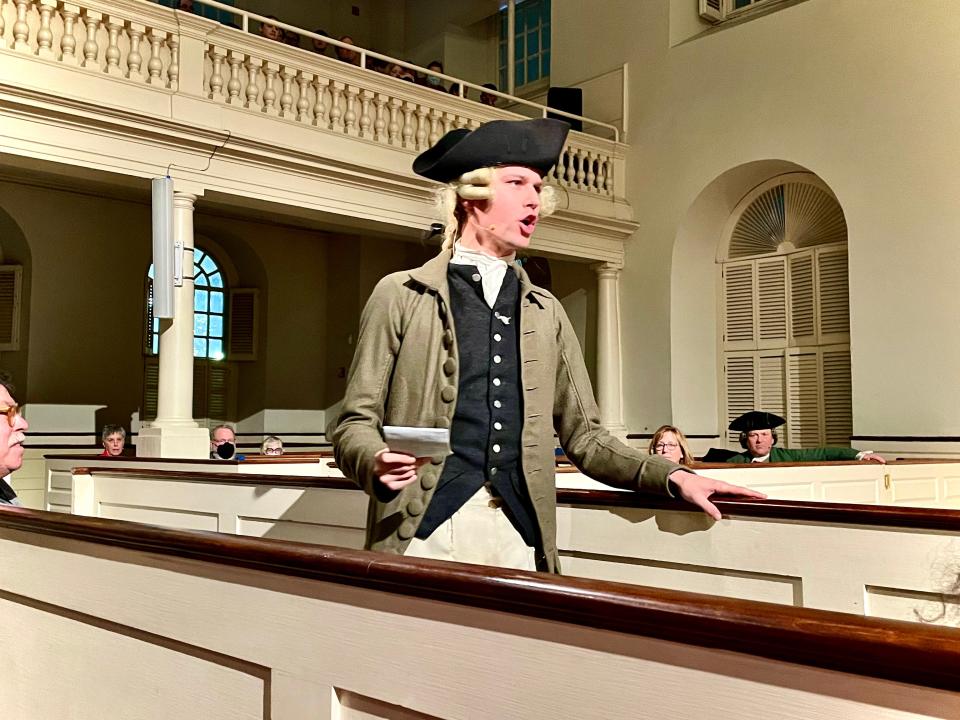
“Taxation without representation is tyranny,” shouts a colonist, most eloquently. It may or not have been James Otis Jr., who is credited widely as saying the pertinent sentence, simply because he wrote so many such rousing epithets.
Cries of “Huzzah!” are matched by much stamping of feet — oh, it’s an impassioned lot here tonight. There can be no agreement in this room on this fateful night.
As tempers rise, several men — first and foremost among them is Sam Adams — suddenly storm out and leave in a huff. Soon there will be shouts outside — something is going on. Men are heading to Griffin Wharf!
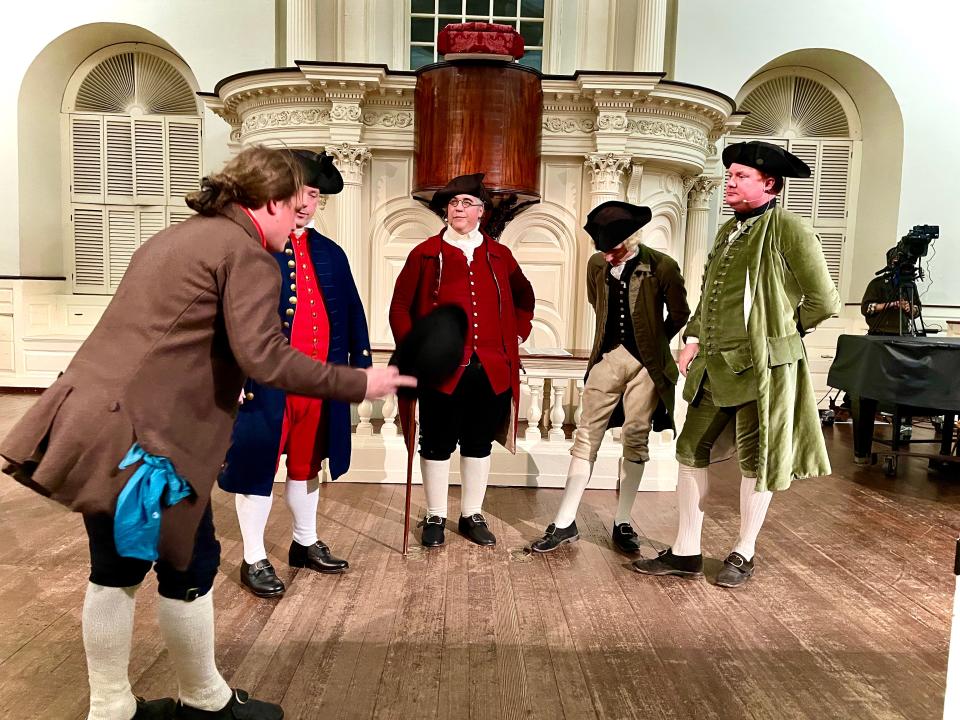
A night to remember
In 1773, Griffin Wharf would have been nearer to the Old South Meeting House. This once-bustling center of commerce was lost to landfill during the city’s expansion through the 19th century. In the 1920s, a plaque was erected at Congress and Purchase streets noting its significance as the place where the Boston Tea Party took place.
Back in 1773, with the meeting adjourned, the actions of that historic night then shifted to the harbor. For the reenactment, the Boston Tea Party Ships & Museum, located on the Congress Street Bridge, not far from where Griffin’s Wharf once stood, is a good stand-in. Replicas of the Beaver, Dartmouth and Eleanor are moored at the museum. Some have tea chests in their cargo holds.
Now, tea was not the mass-produced cheap commodity as it is today. It was expensive and three ships laden with tea amounted to quite a treasure chest. Dumping that lot in the harbor was an unthinkable act then — now, what they did seems rather humorous and hardly treasonous. But it was an attack on personal property — the property of a Crown ally, too.
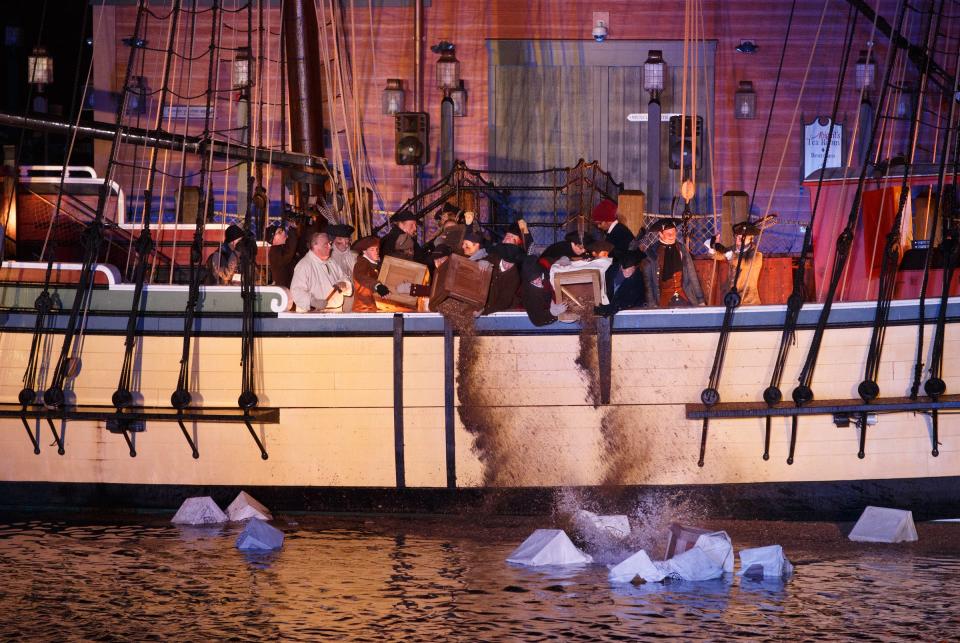
Though dumping anything in the precious harbor waters is not to be encouraged, the Tea Party Museum joins the reenactment with a ceremonious tea dumping into the water each year. On Sept. 27, the very day the ships laden with tea set sail from England for Boston in 1773, the East India Company — which still exists — held a press conference in London marking the 250th anniversary with a new cargo of tea, which was sent to Boston and will be dumped this Dec. 16.
This year, the drum and fife parade from the Old South Meeting House to the museum resumes. But the actual act in 1773 would have been quite different. For one thing, due to the seriousness of the crime against private property— the East India Company’s tea cargo — there would have been no such fanfare. Even Sam Adams and his motley crew sought to hide their identity and dressed up as Mohawk Indians.
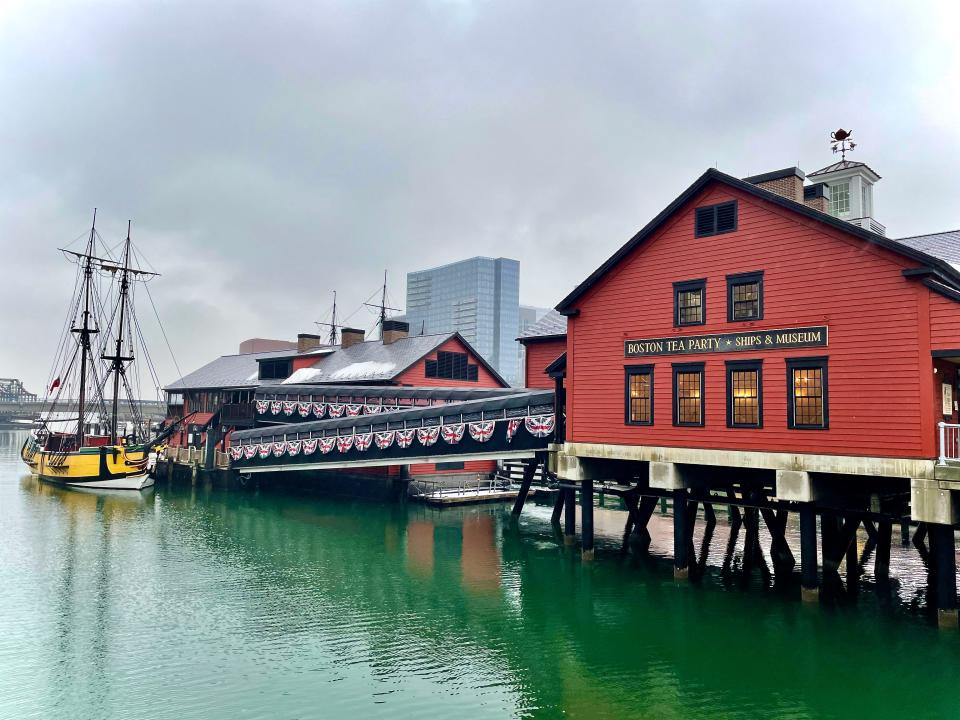
But where on a minute’s notice did Adams find such costumes? The local open-all-night Halloween costume store? Perhaps Adams planned this well in advance and the protagonists had their disguises stashed, ready for their antics.
It is indeed a night to remember and what a thrill to be sitting in the very places where the debate took place, watching Sam Adams and his angry supporters storm off — we know where they are going: off to the harbor to make mischief with some tea!
For more information on all events and for tickets, go to revolutionaryspaces.org.
Tea Time!
As if to give those Brits a bit of a last laugh, the holiday season in Boston is afternoon tea season. At these hotels, it’s an occasion to dress up and tip a pinky while sipping exquisite teas and nibbling darling little bits and bobs. A cozy overnight stay is a delicious option, too.
At Four Seasons Hotel One Dalton Street, which is tucked in a quiet corner of Back Bay near Symphony Hall, afternoon tea is served every weekend in the chic Trifecta lounge. The cake stand brims with colorful cakes and pretty savories, and a choice of fine teas is served in bright floral designed fine china tea pots — cunning devices these: the cup is underneath the pot! Afternoon tea includes a glass of Mumm Champagne to begin with and a liqueur paired to the tea flavors, say Earl Grey with Grand Marnier (rooms from $850 per night. fourseasons.com/onedalton).
Overlooking the harbor, afternoon tea at the Rowes Wharf Sea Grille, inside the Boston Harbor Hotel, pairs a variety of tea sandwiches and pastries with a selection of teas, including herbal South African rooibos, Japanese jasmine, or Chinese oolong. The hotel’s signature tea cocktails may be added to afternoon tea service: Tropical Garden shakes up oolong tea with vodka and Grand Marnier; the Green Tea Sparkler tops off green tea, peach liqueur and peach puree with Prosecco (rooms from $533 per night; bostonharborhotel.com).
The Newbury serves seasonal tea in its second-floor salon underneath Murano glass chandeliers, made for the original Ritz-Carlton that opened the building in 1927. Tea includes a glass of bubbly for those who desire it, and hot cocoa for children. The super-cute fine china tea set is especially designed for the hotel and coopts the Make Way for the Ducklings story into its design. Along with small savories and sweets, excellent scones are served with jams and thick cream. Year-round, guests at the beguiling boutique hotel may take tea in their rooms. Call the fireplace butler to lay a fire in the original wood-burning hearth (rooms from $600 per night; thenewburyboston.com). Could anything be cozier?
This article originally appeared on Telegram & Gazette: The Boston Tea Party parties on!

